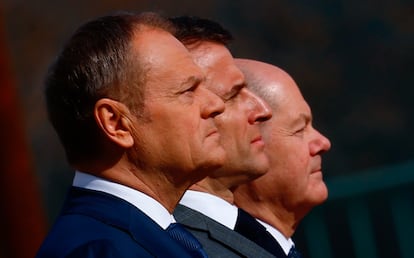Faced with Putin, the answer is action or defeat
European leaders are taking steps to bolster military support for Ukraine. But more efforts must be carried out urgently. Without them, the result will not be peace, but a debacle

As the electoral farce designed to perpetuate Vladimir Putin on the Kremlin throne began in Russia, the leaders of Germany, France and Poland held a meeting in Berlin to send a message of unity in support of Ukraine. In the EU there is a broad political consensus on the need to take consistent steps to improve the continent’s ability to support Kyiv and guarantee its own future security in a context that features a resilient Kremlin and an evanescent White House. The consensus encompasses social democratic, popular or liberal forces, such as the three leaders of the Weimar triangle meeting in Berlin. However, significant discrepancies and cumbersome processes are complicating the path when circumstances demand urgent action. It is likely that the outcome of the war will be decided by what is done in these coming months.
As for the underlying consensus, it is seen in the facts. Germany, with a social democratic chancellor at the helm, is leading a powerful increase in military spending and spearheading military aid to Ukraine from within the EU. France, with a liberal president, is showing determination to the point of refusing to rule out the possibility of sending of soldiers to Ukraine in the future. The European Commission, headed by the popular Ursula von der Leyen, is pushing, among other things, a new defense industrial strategy; and the high representative of Foreign Affairs and Security, the social democrat Josep Borrell, is among the most eloquent and effective promoters of the idea that it is necessary to make efforts, and urgently, to support Kyiv in its defense and rise to the transcendental challenge ahead.
This consensus is taking place around a widely shared idea: giving up the military effort does not lead to peace, but to defeat. This was stated by Macron in a televised interview in France on Thursday. The president, author of a regrettable turn to the right on immigration matters, is right in this, expressing a concept on which the vast majority of the European political spectrum agrees.
Of course there are some minor parties, representatives of major parties and in general an appreciable segment of European society who feel an understandable reluctance towards the prospect of rearmament. But those citizens with legitimate misgivings should first consider that it is up to the Ukrainians to decide their future, and they rightly do not want to give in to aggression with a possible pact that, in addition to greenlighting an amputation of territory, would not provide any guarantees of future peace. And then they should ask themselves if we should leave Ukrainians stranded in their resistance and if it is from weakness that peace can be achieved today in Ukraine and guaranteed tomorrow in Europe, when sitting on the other side there is not Gandhi, but Putin, an individual for whom only the perspective of losing, not respect for pacts, seems to be an inhibiting circumstance.
If, with dwindling American aid, Europeans do not reinforce their support for Kyiv, it is most likely that Moscow will opt for subjugating Ukraine—its long-standing desire—not for stopping and negotiating. And if it subjugates Ukraine, can we trust that from then on we will have a pacifist Kremlin? Sitting back and waiting while Russia is a war economy and Trump has a chance to win in the U.S. is taking a big risk, to say the least. Except for the shareholders of weapons companies, almost all of us dislike having to spend on weapons instead of putting everything into hospitals and schools. But the situation is what it is. Ukraine is suffering, its resistance faltering. And, in a sector like defense, decisions about new supplies or production take months — or years –— to materialize.
Much suggests that leaders understand the sense of urgency. At the Berlin meeting, Scholz said there was agreement to use interest collected on Russia’s frozen assets to help Ukraine. The Commission approved this week a new military assistance fund for Kyiv worth €5 billion, and another €500 million to promote ammunition production capacity.
But between announcements and facts there is a distance. And strategic consensus does not dissipate tactical dissent. There are disagreements on how to raise the much needed money — for example, whether to resort to a common debt issue — on how to spend it, how much of it should go to effective weapons available on the market, and how much on European production that guarantees autonomy in the medium and long term; or even on how to help Kyiv specifically. Macron talks tough, but France has provided much less aid to Ukraine than Germany, even taking into account the different size of GDP, and it stopped the necessary purchase of material outside the EU. Scholz has done a lot, but his hesitations—often saying no at first and accepting later— and those of others have wasted precious time.
Ukraine continues to defend itself and has managed to inflict considerable damage on Russia. But their situation is fragile. Very fragile. Every week matters. Nothing ensures that the paralysis of U.S. aid will be unblocked. If there is no change of step, a reversal, the conflict will gradually move closer to a defeat for Kyiv than to a just peace.
Sign up for our weekly newsletter to get more English-language news coverage from EL PAÍS USA Edition
Tu suscripción se está usando en otro dispositivo
¿Quieres añadir otro usuario a tu suscripción?
Si continúas leyendo en este dispositivo, no se podrá leer en el otro.
FlechaTu suscripción se está usando en otro dispositivo y solo puedes acceder a EL PAÍS desde un dispositivo a la vez.
Si quieres compartir tu cuenta, cambia tu suscripción a la modalidad Premium, así podrás añadir otro usuario. Cada uno accederá con su propia cuenta de email, lo que os permitirá personalizar vuestra experiencia en EL PAÍS.
¿Tienes una suscripción de empresa? Accede aquí para contratar más cuentas.
En el caso de no saber quién está usando tu cuenta, te recomendamos cambiar tu contraseña aquí.
Si decides continuar compartiendo tu cuenta, este mensaje se mostrará en tu dispositivo y en el de la otra persona que está usando tu cuenta de forma indefinida, afectando a tu experiencia de lectura. Puedes consultar aquí los términos y condiciones de la suscripción digital.









































